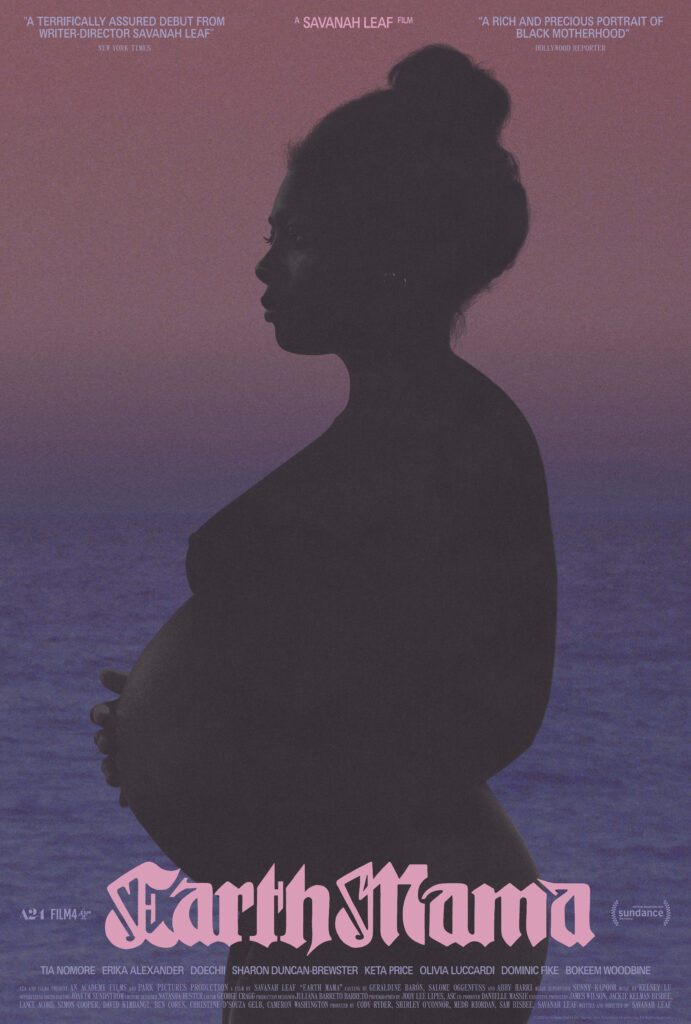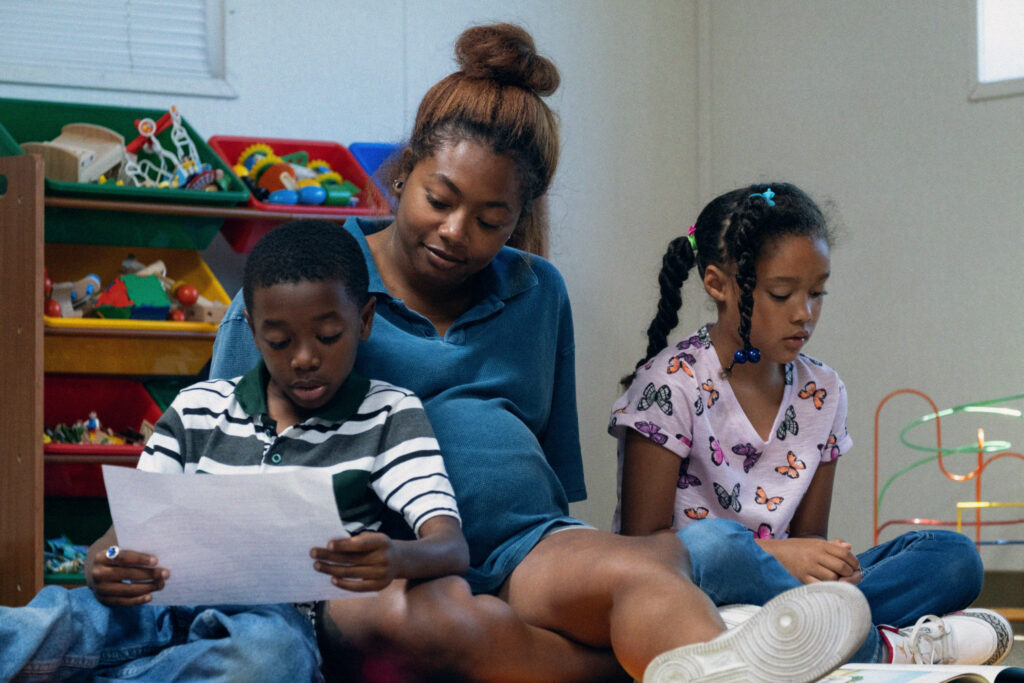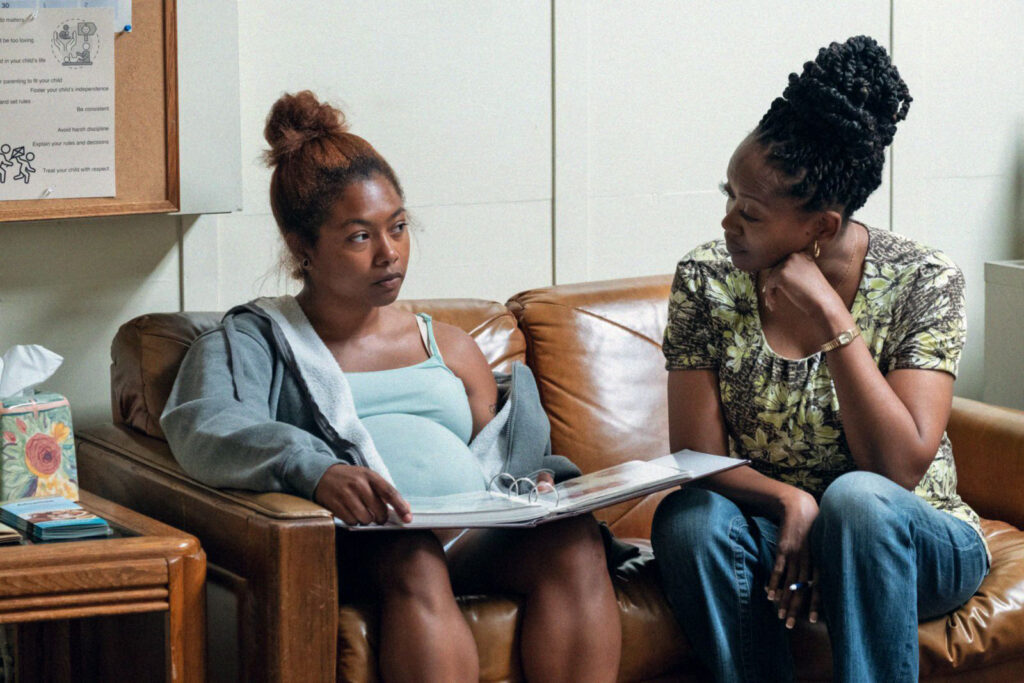By Kirsten Coachman
Opening in San Francisco this weekend is “Earth Mama,” the emotionally gripping feature film debut from award-winning Writer/Director Savanah Leaf. Both set and filmed in the Bay Area, the film follows Gia (Oakland rapper Tia Nomore in her big screen debut), a young expectant mother who is working toward regaining custody of her two children through a frustrating foster care system as she considers a different path for her third.
“Earth Mama” also stars Erika Alexander (“Living Single,” “Get Out”), Dominic Fike (“Euphoria”), as well as newcomers East Oakland native Keta Price and rapper Doechii.

Earlier this year, the film, based on Leaf’s 2020 documentary short, “The Heart Still Hums,” which she co-directed with actor Taylor Russell, took home the Audience Award at the 2023 SFFILM Festival for Best Narrative Feature.
Art U News recently had the opportunity to sit down with both Leaf and Nomore during their Bay Area press stop to discuss how familial influences helped shape “Earth Mama,” collaboration on set, and the importance of taking creative risks.
Why was it important for you to tell this story of motherhood in your feature film debut?
Savanah Leaf (SL): Mothers, in general, have been such an important part of my life. I grew up with just my mom for most of my life, so mothers have had this huge influence on me. And this story was based initially off of my relationship to my sister. It kind of took its own form with the people that we had involved, but it started in a personal place and then became more and more important as I kept going and hearing how other people connected to the film.
Your documentary short, “The Heart Still Hums,” I imagine, provided great insight for this film—how much additional research went into the writing of the film?
SL: So that film, I look at it as research, but it was almost like emotional research rather than specifics on the foster care system. Afterward, I did a lot of research on, like, what is the bureaucracy of this? Like, what kind of checklist is there? What are the statistics around women in these circumstances? What is their housing difficulty? How much money do people tend to have? Do they have to pay money to their foster—their children’s foster parents? All these questions around the logistical aspects of what this film is about came kind of after the short film, but the short film is grounded in emotional truths.
Did your approach to filmmaking change at all, going from making a documentary to a narrative film?
SL: Yes, in that, I think the sensitivity to the subject, the people, is very different. When you work in the documentary space, especially with mothers and when they’re going through, you know, court cases while we’re filming, I personally don’t wanna take it too far where anything they say or any way that we film could be used potentially against them. That’s not really my intention. And so there’s a layer to it that I never wanted to go beyond in a documentary space. Whereas when it’s fictionalized, I can kind of draw upon so many different things. It’s not one person’s story. So, in a way, I feel more liberated. I feel like I’m not causing any harm to any person. And that’s the power of fiction. Sometimes you can be even more truthful, you know? Because there are some places you don’t wanna go with a documentary.
Tia, coming from the world of music, was there any hesitation stepping into a different creative playing field as a first-time actor?
Tia Nomore (TN): I think initially, yeah, of course. You wanna be good at whatever you’re doing. And especially if it’s gonna be seen on a big screen. It’s like, bro, what? [Laughs] But I think as an artist, the thing that I kept bringing myself comfort around was sometimes when I go into the booth, I might hear my voice in my head, but the execution is different. It might take me several takes to achieve what’s here. And I might find that it’s not just my voice that I’m hearing, but it’s a multitude of layers of my voice that gets me to the ultimate—the last sound. In acting, I have to do the same thing there, right? Where it’s just like take the opportunity each take to be present with yourself and trust your instincts, ultimately, which Savanah’s really good at making us feel comfortable in doing for this film. Any hesitation that I had didn’t last very long. It was kind of like, “F–k that. I wanna do this.” So I chose to see it through like that.

How was it stepping into the role of Gia?
TN: I think being a mother is a very sacred space to be in your life. And there are glimpses of society that get to see parts of your journey, but not all the way through. You don’t really get to see all of the anxieties that you have, and maybe you don’t have a lot of people in your room when you’re giving birth these days. I’m a pandemic parent, right? So I didn’t have a lot of support, you know what I mean? So feeling that kind of claustrophobia in Gia where she’s outsourcing everything, there’s just this like tightness around motherhood and all of its stages, but when you have your baby, it’s like, “Oh, gimme the baby.” And you kind of put Mama to the side.
Like, nobody really comes with gifts for mom, and it’s just a plethora of gifts for baby, and you don’t even know what to do with it. You don’t even know what your needs are. And it’s like a lot of sorting and navigating as a new mom. And through Gia, I was able to just put a lot of things to the side or lay them to rest that I was navigating in real life as Tia. So I’m grateful to Gia for even taking on my s–t as a person and carrying it out.
I was thrilled to see Erika Alexander in the film as Miss Carmen—can you talk a little bit about her involvement in the film?
SL: We were looking for an experienced actor for that particular role because it’s a role where an experienced actor can really help our lead because they could play off each other, and it makes sense for the role. She’s kind of like a mother of the mothers in the mothers’ group. And Erika really related to the character in many ways [and] could draw upon herself and the people around her for it. But also, I love that we’ve seen her in so many different ways, and this feels like something new. And she’s also so good with people, so good with all of our cast—some of which have never acted before, never imagined themself in the space, and they’re kind of losing their minds seeing her—and she’s just like really grounded, and she’s just talking to everyone and very humble. She also started from a place—I think she was street cast—and that allowed her to relate to a lot of people that were in the scenes as well. I think no one else could have played that role because she brought so much of who she is, even beyond the character, into the creation of the film.

As you mentioned, the film features a number of first-time actors—what was the collaboration on set like?
SL: In a way, I’m a first-time feature filmmaker too, so we were kind of going through the first-time feature together, [laughs] which is cool. I’m guiding, but I’m also learning at the same time and learning how to do it in a way that’s sensitive to people. So I think we all helped each other, but I also think they helped bring so much authenticity to the story and the place. This is a Bay film, and we brought that together to the film. I really enjoyed that element of it. It made it feel more like me because I don’t like faking it. I’m only gonna come as myself, and that’s how everybody else came, which was really exciting.
As far as taking creative risks, what would you both advise for students who are looking to expand their creative horizons but maybe are nervous about jumping into the unknown?
SL: You don’t create honest art unless you take huge risks. I think that’s where art is most exciting for me. And I see that even when I’m looking at other people’s art. When I look at someone’s body of work, and I see their first film, oftentimes that’s like my favorite of their films, and then they get a little lazy and start making stuff that’s very similar to that first film. And then, all of a sudden, at one point in their career, they do something completely different. Sometimes you love it, sometimes you hate it, but that’s really exciting, you know? And so, for me, that place of risk-taking is where you see the most creativity, you get inspired by the people around you ’cause they’re also taking risks. Putting yourself in those riskier scenarios or those places where you’ve got limited time to make something, limited resources, anything that’s like pushing you to this place that you think is impossible, I think it’s about to be fruitful for you, as an artist.
TN: I think it’s important to ask ourselves, as creatives, all the time, what are we inspired by? And if you’re solely inspired in everything that you do by one f–king thing, then just do that one thing. But it’s very rare that one human is inspired by solely one thing only. So all of the things that inspire you are all of the things that you’re meant to be in alignment with. So if I’m a musician, but I’ve always been inspired by cinema, it’s important for me to make my music movie-esque, like movie-like. And whether that’s me bringing out characters in my ad-libs and just being crazy maniacal when I wanna be, or taking a moment to be very soft and sweet and sing because that’s all that my heart can expel, you’re giving the world an opportunity to see you as a full person and all that makes you, which is never one thing. So do all the things, you know. You don’t have to be great at ’em but do ’em.
“Earth Mama” is now playing in San Francisco. This Q&A has been edited for length and clarity.
